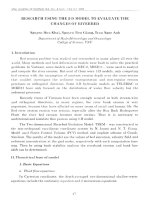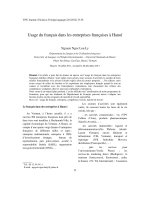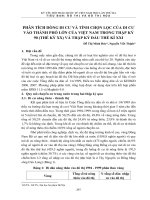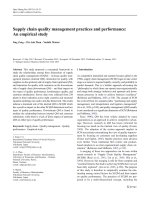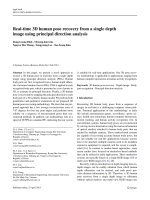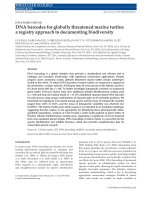DSpace at VNU: Implementing Corporate Social Responsibility Towards Sustainable Development: A Case Study of SMEs in Thanh Hoa Province
Bạn đang xem bản rút gọn của tài liệu. Xem và tải ngay bản đầy đủ của tài liệu tại đây (257.85 KB, 14 trang )
������������������������������������������������������������������������������������������������������������������������������������������������������������������������������������������������������������������������������������������������������������������������������������������������������������������������������������������������������������������������������������������������������������������������������������������������������������������������������������������������������������������������������������������������������������������������������������������������������������������������������������������������������������������������������������������������������������������������������������������������������������������������������������������������������������������������������������������������������������������������������������������������������������������������������������������������������������������������������������������������������������������������������������������������������������������������������������������������������������������������������������������������������������������������������������������������������������������������������������������������������������������������������������������������������������������������������������������������������������������������������������������������������������������������������������������������������������������������������������������������������������������������������������������������������������������������������������������������������������������������������������������������������������������������������������������������������������������������������������������������������������������������������������������������������������������������������������������������������������������������������������������������������������������������������������������������������������������������������������������������������������������������������������������������������������������������������������������������������������������������������������������������������������������������������������������������������������������������������������������������������������������������������������������������������������������������������������������������������������������������������������������������������������������������������������������������������������������������������������������������������������������������������������������������������������������������������������������������������������������������������������������������������������������������������������������������������������������������������������������������������������������������������������������������������������������������������������������������������������������������������������������������������������������������������������������������������������������������������������������������������������������������������������������������������������������������������������������������������������������������������������������������������������������������������������������������������������������������������������������������������������������������������������������������������������������������������������������������������������������������������������������������������������������������������������������������������������������������������������������������������������������������������������������������������������������������������������������������������������������������������������������������������������������������������������������������������������������������������������������������������������������������������������������������������������������������������������������������������������������������������������������������������������������������������������������������������������������������������������������������������������������������������������������������������������������������������������������������������������������������������������������������������������������������������������������������������������������������������������������������������������������������������������������������������������������������������������������������������������������������������������������������������������������������������������������������������������������������������������������������������������������������������������������������������������������������������������������������������������������������������������������������������������������������������������������������������������������������������������������������������������������������������������������������������������������������������������������������������������������������������������������������������������������������������������������������������������������������������������������������������������������������������������������������������������������������������������������������������������������������������������������������������������������������������������������������������������������������������������������������������������������������������������������������������������������������������������������������������������������������������������������������������������������������������������������������������������������������������������������������������������������������������������������������������������������������������������������������������������������������������������������������������������������������������������������������������������������������������������������������������������������������������������������������������������������������������������������������������������������������������������������������������������������������������������������������������������������������������������������������������������������������������������������������������������������������������������������������������������������������������������������������������������������������������������������������������������������������������������������������������������������������������������������������������������������������������������������������������������������������������������������������������������������������������������������������������������������������������������������������������������������������������������������������������������������������������������������������������������������������������������������������������������������������������������������������������������������������������������������������������������������������������������������������������������������������������������������������������������������������������������������������������������������������������������������������������������������������������������������������������������������������������������������������������������������������������������������������������������������������������������������������������������������������������������������������������������������������������������������������������������������������������������������������������������������������������������������������������������������������������������������������������������������������������������������������������������������������������������������������������������������������������������������������������������������������������������������������������������������������������������������������������������������������������������������������������������������������������������������������������������������������������������������������������������������������������������������������������������������������������������������������������������������������������������������������������������������������������������������������������������������������������������������������������������������������������������������������������������������������������������������������������������������������������������������������������������������������������������������������������������������������������������������������������������������������������������������������������������������������������������������������������������������������������������������������������������������������������������������������������������������������������������������������������������������������������������������������������������������������������������������������������������������������������������������������������������������������������������������������������������������������������������������������������������������������������������������������������������������������������������������������������������������������������������������������������������������������������������������������������������������������������������������������������������������������������������������������������������������������������������������������������������������������������������������������������������������������������������������������������������������������������������������������������������������������������������������������������������������������������������������������������������������������������������������������������������������������������������������������������������������������������������������������������������������������������������������������������������������������������������������������������������������������������������������������������������������������������������������������������������������������������������������������������������������������������������������������������������������������������������������������������������������������������������������������������������������������������������������������������������������������������������������������������������������������������������������������������������������������������������������������������������������������������������������������������������������������������������������������������������������������������������������������������������������������������������������������������������������������������������������������������������������������������������������������������������������������������������������������������������������������������������������������������������������������������������������������������������������������������������������������������������������������������������������������������������������������������������������������������������������������������������������������������������������������������������������������������������������������������������������������������������������������������������������������������������������������������������������������������������������������������������������������������������������������������������������������������������������������������������������������������������������������������������������������������������������������������������������������������������������������������������������������������������������������������������������������������������������������������������������������������������������������������������������������������������������������������������������������������������������������������������������������������������������������������������������������������������������������������������������������������������������������������������������������������������������������������������������������������������������������������������������������������������������������������������������������������������������������������������������������������������������������������������������������������������������������������������������������������������������������������������������������������������������������������������������������������������������������������������������������������������������������������������������������������������������������������������������������������������������������������������������������������������������������������������������������������������������������������������������������������������������������������������������������������������������������������������������������������������������������������������������������������������������������������������������������������������������������������������������������������������������������������������������������������������������������������������������������������������������������������������������������������������������������������������������������������������������������������������������������������������������������������������������������������������������������������������������������������������������������������������������������������������������������������������������������������������������������������������������������������������������������������������������������������������������������������������������������������������������������������������������������������������������������������������������������������������������������������������������������������������������������������������������������������������������������������������������������������������������������������������������������������������������������������������������������������������������������������������������������������������������������������������������������������������������������������������������������������������������������������������������������������������������������������������������������������������������������������������������������������������������������������������������������������������������������������������������������������������������������������������������������������������������������������������������������������������������������������������������������������������������������������������������������������������������������������������������������������������������������������������������������������������������������������������������������������������������������������������������������������������������������������������������������������������������������������������������������������������������������������������������������������������������������������������������������������������������������������������������������������������������������������������������������������������������������������������������������������������������������������������������������������������������������������������������������������������������������������������������������������������������������������������������������������������������������������������������������������������������������������������������������������������������������������������������������������������������������������������������������������������������������������������������������������������������������������������������������������������������������������������������������������������������������������������������������������������������������������������������������������������������������������������������������������������������������������������������������������������������������������������������������������������������������������������������������������������������������������������������������������������������������������������������������������������������������������������������������������������������������������������������������������������������������������������������������������������������������������������������������������������������������������������������������������������������������������������������������������������������������������������������������������������������������������������������������������������������������������������������������������������������������������������������������������������������������������������������������������������������������������������������������������������������������������������������������������������������������������������������������������������������������������������������������������������������������������������������������������������������������������������������������������������������������������������������������������������������������������������������������������������������������������������������������������������������������������������������������������������������������������������������������������������������������������������������������������������������������������������������������������������������������������������������������������������������������������������������������������������������������������������������������������������������������������������������������������������������������������������������������������������������������������������������������������������������������������������������������������������������������������������������������������������������������������������������������������������������������������������������������������������������������������������������������������������������������������������������������������������������������������������������������������������������������������������������������������������������������������������������������������������������������������������������������������������������������������������������������������������������������������������������������������������������������������������������������������������������������������������������������������������������������������������������������������������������������������������������������������������������������������������������������������������������������������������������������������������������������������������������������������������������������������������������������������������������������������������������������������������������������������������������������������������������������������������������������������������������������������������������������������������������������������������������������������������������������������������������������������������������������������������������������������������������������������������������������������������������������������������������������������������������������������������������������������������������������������������������������������������������������������������������������������������������������������������������������������������������������������������������������������������������������������������������������������������������������������������������������������������������������������������������������������������������������������������������������������������������������������������������������������������������������������������������������������������������������������������������������������������������������������������������������������������������������������������������������������������������������������������������������������������������������������������������������������������������������������������������������������������������������������������������������������������������������������������������������������������������������������������������������������������������������������������������������������������������������������������������������������������������������������������������������������������������������������������������������������������������������������������������������������������������������������������������������������������������������������������������������������������������������������������������������������������������������������������������������������������������������������������������������������������������������������������������������������������������������������������������������������������������������������������������������������������������������������������������������������������������������������������������������������������������������������������������������������������������������������������������������������������������������������������������������������������������������������������������������������������������������������������������������������������������������������������������������������������������������������������������������������������������������������������������������������������������������������������������������������������������������������������������������������������������������������������������������������������������������������������������������������������������������������������������������������������������������������������������������������������������������������������������������������������������������������������������������������������������������������������������������������������������������������������������������������������������������������������������������������������������������������������������������������������������������������������������������������������������������������������������������������������������������������������������������������������������������������������������������������������������������������������������������������������������������������������������������������������������������������������������������������������������������������������������������������������������������������������������������������������������������������������������������������������������������������������������������������������������������������������������������������������������������������������������������������������������������������������������������������������������������������������������������������������������������������������������������������������������������������������������������������������������������������������������������������������������������������������������������������������������������������������������������������������������������������������������������������������������������������������������������������������������������������������������������������������������������������������������������������������������������������������������������������������������������������������������������������������������������������������������������������������������������������������������������������������������������������������������������������������������������������������������������������������������������������������������������������������������������������������������������������������������������������������������������������������������������������������������������������������������������������������������������������������������������������������������������������������������������������������������������������������������������������������������������������������������������������������������������������������������������������������������������������������������������������������������������������������������������������������������������������������������������������������������������������������������������������������������������������������������������������������������������������������������������������������������������������������������������������������������������������������������������������������������������������������������������������������������������������������������������������������������������������������������������������������������������������������������������������������������������������������������������������������������������������������������������������������������������������������������������������������������������������������������������������������������������������������������������������������������������������������������������������������������������������������������������������������������������������������������������������������������������������������������������������������������������������������������������������������������������������������������������������������������������������������������������������������������������������������������������������������������������������������������������������������������������������������������������������������������������������������������������������������������������������������������������������������������������������������������������������������������������������������������������������������������������������������������������������������������������������������������������������������������������������������������������������������������������������������������������������������������������������������������������������������������������������������������������������������������������������������������������������������������������������������������������������������������������������������������������������������������������������������������������������������������������������������������������������������������������������������������������������������������������������������������������������������������������������������������������������������������������������������������������������������������������������������������������������������������������������������������������������������������������������������������������������������������������������������������������������������������������������������������������������������������������������������������������������������������������������������������������������������������������������������������������������������������������������������������������������������������������������������������������������������������������������������������������������������������������������������������������������������������������������������������������������������������������������������������������������������������������������������������������������������������������������������������������������������������������������������������������������������������������������������������������������������������������������������������������������������������������������������������������������������������������������������������������������������������������������������������������������������������������������������������������������������������������������������������������������������������������������������������������������������������������������������������������������������������������������������������������������������������������������������������������������������������������������������������������������������������������������������������������������������������������������������������������������������������������������������������������������������������������������������������������������������������������������������������������������������������������������������������������������������������������������������������������������������������������������������������������������������������������������������������������������������������������������������������������������������������������������������������������������������������������������������������������������������������������������������������������������������������������������������������������������������������������������������������������������������������������������������������������������������������������������������������������������������������������������������������������������������������������������������������������������������������������������������������������������������������������������������������������������������������������������������������������������������������������������������������������������������������������������������������������������������������������������������������������������������������������������������������������������������������������������������������������������������������������������������������������������������������������������������������������������������������������������������������������������������������������������������������������������������������������������������������������������������������������������������������������������������������������������������������������������������������������������������������������������������������������������������������������������������������������������������������������������������������������������������������������������������������������������������������������������������������������������������������������������������������������������������������������������������������������������������������������������������������������������������������������������������������������������������������������������������������������������������������������������������������������������������������������������������������������������������������������������������������������������������������������������������������������������������������������������������������������������������������������������������������������������������������������������������������������������������������������������������������������������������������������������������������������������������������������������������������������������������������������������������������������������������������������������������������������������������������������������������������������������������������������������������������������������������������������������������������������������������������������������������������������������������������������������������������������������������������������������������������������������������������������������������������������������������������������������������������������������������������������������������������������������������������������������������������������������������������������������������������������������������������������������������������������������������������������������������������������������������������������������������������������������������������������������������������������������������������������������������������������������������������������������������������������������������������������������������������������������������������������������������������������������������������������������������������������������������������������������������������������������������������������������������������������������������������������������������������������������������������������������������������������������������������������������������������������������������������������������������������������������������������������������������������������������������������������������������������������������������������������������������������������������������������������������������������������������������������������������������������������������������������������������������������������������������������������������������������������������������������������������������������������������������������������������������������������������������������������������������������������������������������������������������������������������������������������������������������������������������������������������������������������������������������������������������������������������������������������������������������������������������������������������������������������������������������������������������������������������������������������������������������������������������������������������������������������������������������������������������������������������������������������������������������������������������������������������������������������������������������������������������������������������������������������������������������������������������������������������������������������������������������������������������������������������������������������������������������������������������������������������������������������������������������������������������������������������������������������������������������������������������������������������������������������������������������������������������������������������������������������������������������������������������������������������������������������������������������������������������������������������������������������������������������������������������������������������������������������������������������������������������������������������������������������������������������������������������������������������������������������������������������������������������������������������������������������������������������������������������������������������������������������������������������������������������������������������������������������������������������������������������������������������������������������������������������������������������������������������������������������������������������������������������������������������������������������������������������������������������������������������������������������������������������������������������������������������������������������������������������������������������������������������������������������������������������������������������������������������������������������������������������������������������������������������������������������������������������������������������������������������������������������������������������������������������������������������������������������������������������������������������������������������������������������������������������������������������������������������������������������������������������������������������������������������������������������������������������������������������������������������������������������������������������������������������������������������������������������������������������������������������������������������������������������������������������������������������������������������������������������������������������������������������������������������������������������������������������������������������������������������������������������������������������������������������������������������������������������������������������������������������������������������������������������������������������������������������������������������������������������������������������������������������������������������������������������������������������������������������������������������������������������������������������������������������������������������������������������������������������������������������������������������������������������������������������������������������������������������������������������������������������������������������������������������������������������������������������������������������������������������������������������������������������������������������������������������������������������������������������������������������������������������������������������������������������������������������������������������������������������������������������������������������������������������������������������������������������������������������������������������������������������������������������������������������������������������������������������������������������������������������������������������������������������������������������������������������������������������������������������������������������������������������������������������������������������������������������������������������������������������������������������������������������������������������������������������������������������������������������������������������������������������������������������������������������������������������������������������������������������������������������������������������������������������������������������������������������������������������������������������������������������������������������������������������������������������������������������������������������������������������������������������������������������������������������������������������������������������������������������������������������������������������������������������������������������������������������������������������������������������������������������������������������������������������������������������������������������������������������������������������������������������������������������������������������������������������������������������������������������������������������������������������������������������������������������������������������������������������������������������������������������������������������������������������������������������������������������������������������������������������������������������������������������������������������������������������������������������������������������������������������������������������������������������������������������������������������������������������������������������������������������������������������������������������������������������������������������������������������������������������������������������������������������������������������������������������������������������������������������������������������������������������������������������������������������������������������������������������������������������������������������������������������������������������������������������������������������������������������������������������������������trongly make the bright
future of CSR and sustainable development in
Vietnam to be true.
Last but not least, it is clear from this study
and previous ones that CSR in Vietnam has
recently developed from a mere business
consideration to a conceptual framework that
enables cooperative solutions to societal
problems. As shown in many other countries,
CSR has become an important tool to help
countries everywhere address some of the key
challenges posed by today’s globalizing world
like sustainable growth, prosperity, social
stability and justice (Nguyen, 2008). There is a
great potential for CSR to do so as Vietnamese
government commitment to social cohesion is
very strong, and level of integration in global
economy and the level of privatization is
continuously rising.
References
[1] Andriof, J., McIntosh, M. (eds) (2001), Perspectives
on Corporate Citizenship, Sheffield UK: Greenleaf
Publishing.
[2] Andriof, J., Waddock, S., Husted, B. and Rahman,
S. S. (eds) (2002), Unfolding Stakeholder Thinking,
pp. 19-43, Sheffield UK: Greenleaf Publishing.
[3] Bowen, H. R. (1953), Social Responsibility of
Businessman, Harper & Row, New York.
[4] Brown, T. J., Dacin, P. A. (1997), “The Company
and the Product: Corporate Association and
Consumer Product Responses”, Journal of
Marketing, Vol. 61, No. 1, pp. 68-84.
[5] Caroll, A. B. (1979), “A Three-dimensional
Conceptual Model of Corporate Performance”, The
Academy of Management Review, Vol. 4, No. 4,
pp. 497-505.
[6] Chen, C. H., Wongsurawat, W. (2011), “Core
Construct of Corporate Social Responsibility: A
Path Analysis”, Asia-Pacific Journal of Business
Administration, Vol. 3, No. 3, pp. 47-61.
[7] Cleghorn, B. (2004), “CSR: Creating Greater
Competitive Advantage”, Opening remarks by the
British High Commissioner at the Corporate Social
80
N.P. Mai / VNU Journal of Economics and Business Vol. 29, No. 5E (2013) 67-80
Responsibility Conference, Kuala Lumpur, 21-22
June.
[8] Davis, K. (1973), “The Case For and Against
Business Assumption of Social Responsibilities”,
Academy of Management Journal, Vol. 16, No. 2,
pp. 312-322.
[9] Draper, S. (2000), Corporate Nirvana: Is the Future
Socially Responsible?, London, Industry Society.
[10] Drucker, P. (1984), “The New Meaning of
Corporate Social Responsibility”, California
Management Review, Vol. 26, No. 2, pp. 53-65.
[11] Drucker, P. (1993), Post-Capitalist Society,
HarperCollins, New York.
[12] Ebner, D. and Baumgartner, R. J. (2006), “The
Relationship between Sustainable Development and
Corporate Social Responsibility”, Paper presented
at Corporate Responsibility Research Conference
2006, Dublin, 4-5 September.
[13] [European Commission (2001), Promoting a
European Framework for Corporate Social
Responsibility: Green Paper, Office for Official
Publications of the European Communities,
Luxembourg.
[14] European Commission (2011), “A Renew EU
Strategy 2011-2014 for Corporate Social
Responsibility”,
Brussels,
< />M:2011:0681:FIN:EN:PDF>, retrieved on 25th
August, 2012.
[15] Gray, R. (2001), Social and Environmental
Responsibility, Sustainability and Accountability,
Can the Corporate Sector Deliver?, Glasgow,
Centre for Social and Environmental Accounting
Research, University of Glasgow.
[16] Jaffe, A. B., Peterson, S. R., Portney, P. R. and
Stavins, R. N. (1995), “Environmental Regulation
and the Competitiveness of US Manufacturing:
What does the Evidence Tell Us?”, Journal of
Economic Literature, Vol. 33, pp. 132-163.
[17] Lewis, S. (2003), “Reputation and Corporate Social
Responsibility”, Journal of Communication
Management, Vol. 7, No. 4, pp. 356-364.
[18] Luo, X., Bhattacharya, C. B. (2006),
“Corporate Social Responsibility, Customer
Satisfaction, and Market Value”, Journal of
Marketing, Vol. 70, pp. 1-18.
[19] Maignan, I., Ferrell, O. C. (2004), “Corporate
Social Responsibility and Marketing”, Journal of
H
[20]
[21]
[22]
[23]
[24]
[25]
[26]
[27]
[28]
[29]
[30]
[31]
the Academy of Marketing Science, Vol. 32, No. 1,
pp. 3-19.
McGuire, J. W. (1963), Business and Society, Mc
Graw-Hill, New York.
Nguyen, Cam Van, and Nguyen, Chan (2008),
“CSR – A Model for Sustainable Social and
Ecological Development in Vietnam”, International
Vision, Special Issue in Corporate Social
Responsibility, No. 12, pp. 49-56.
Nguyen, Dinh Tai, and Le, Thanh Tu (2008),
“Corporate Responsibility towards Employee – The
Most Important Component of Corporate Social
Responsibility”, International Vision, Special Issue
in Corporate Social Responsibility, No. 12, pp. 95106.
Pham, Duc Hieu (2011), “Corporate Social
Responsibility: A Study on Awareness of Managers
and Consumers in Vietnam”, Journal of Accounting
and Taxation, Vol. 3, No. 8, pp. 162-170.
Pham, Van Duc (2010), “Corporate Social
Responsibility in Vietnam: Some pressing
Theoretical and Practical Issues”, Journal of
Philosophy, No. 2 (14), pp. 3-14.
Redman, E. (2005), “Three Models of Corporate
Social Responsibility: Implications for Public
Policy”, Roosevelt Review, pp. 95-108.
Sen, S., Bhattacharya, C. B. (2001), “Does Doing
Good Always Lead to Doing Better? Consumer
Reactions to Corporate Social Responsibility”, Journal
of Marketing Research, 38 (May), pp. 225-243.
Sethi, S. P. (1975), “Dimension of Corporate Social
Responsibility”, California Management Review,
Vol. 17, No. 3, pp. 58-64.
Swift, T. and Zadek, S. (2002), Corporate Social
Responsibility and the Competitive Advantage of
Nations, Copenhagen Center and Institute of Social
and Ethical Accountability.
UNIDO (2002), Corporate Social Responsibility:
Implications for Small and Medium Enterprises in
Developing Countries, Vienna.
WBCSD (2001), Corporate Social Responsibility:
Making Good Business Sense, World Business
Council for Sustainable Development, Geneva.
WBCSD (2002), The Business Case for Sustainable
Development: Making a Difference Towards the
Johannesburg Summit 2002 and Beyond, World
Business Council for Sustainable Development,
Geneva, Switzerland.

